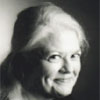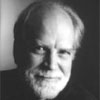|
This interview is excerpted from the conversation led by Paula Gordon
and Bill Russell of The
Paula Gordon Show: Conversations with
People at the Leading EdgeSM
Listen to the full program: (requires Real Player)
Part 1,
Part 2,
Part 3,
Part 4,
Part 5,
Part 6
Atlanta / April 2, 2004
Paula Gordon: Greetings,
all, this is Paula Gordon. Moments are the building
blocks of time and we're mostly oblivious to them,
according to Billy Collins. He says it's the task of
lyrical poetry to bring us back to a sense of the
momentary. "The poem for me begins in clarity
and ends in mystery," says Dr. Collins, former
poet laureate of the United States.
Billy Collins: The interesting part of
writing for me is finding a point in a poem that
allows me to slip into another dimension.
Usually, that's moving from a literal plane to a
completely hypothetical one. It's the
hypothetical, I think, that makes us human.
PG: Dr. Collins
noticed people saying they were no longer going to
put off doing things after September 11, 2001.
BC: Poetry has been saying that for a
few thousand years. Seize the day. Do it now. The
sense behind that imperative is that we don't
have an unlimited number of days. Television says
the same thing all the time—'Everything's
going to be OK.' Contemporary novels are saying,
'Things are not OK.' What poetry is saying is
'Life is beautiful but you're going to die.' So
much of poetry asks us to look at life from the
perspective that death enhances life.
PG: Billy Collins
remembers being slow to find his own
"voice."
BC: I was a little too well behaved in
my earlier poetry, I was trying to be a 'good
poet.' I think releasing a kind of juvenile
delinquent into my poetry was very liberating for
me. I felt I was free to mess around. The
speaking voice in these poems is more of a
character than the autobiographical equivalent of
me, he's a new and improved version of me. If
you're a novelist, you have to invent dozens,
sometimes hundreds of characters. If you're a
poet, you have to invent just one.
PG: Dr. Collins says
he is always imagining his reader as he writes.
BC: These poems are meant to be fairly
intimate communications between me and one other
person. I perform half of the exchange and when
the reader arrives, the exchange is completed.
PG: He also thinks
poetry has a strong vocal appeal.
BC: Most of the devices used in
poetry—meter and rhyme and assonance and the
other kinds of tropes or effects—are really
meant to give the ear pleasure in a way that
prose does not. Poetry also appeals to the ear
because poetry is an interruption of silence. A
poem should be preceded by silence and followed
by silence. A poem for me displaces silence the
way your body displaces water.
PG: He believes that
poetry provides the highest degree of imaginative
freedom of any written art.
BC: Poets are not restricted as a
novelist would be in terms of chronology and
plausibility and inventing characters that then
you have to deal with. In poetry, there is the
form and the craft of it but within that, you
have pretty much carte blanche. For me, the
imaginative excitement is what attracts me to
poetry.
� 1997-2005 The Paula Gordon Show
 Billy Collins'
first online publication
appears in TCR's
Issue 7. Billy Collins'
first online publication
appears in TCR's
Issue 7.
More Billy Collins at TCR:
-Grace
Cavalieri interviews Billy Collins
-Billy Collins reads
"The Yellow Wagtail's Nest" by John Clare
 Paula Gordon's days as a
television host culminated with an Emmy nomination in
1977 for "Small World," a weekly half-hour
show on Chicago’s WMAQTV, NBC’s owned and
operated station, where she was also a station
announcer. She then spent almost two decades in
the business world as she and husband Bill Russell
created, built, then sold one of the Southeast’s
premier film and video companies. Producer and
host of The Paula Gordon Show, Paula also
leads The Clarion Group, a business consultancy. A
Midwesterner, she lives with her husband live in
Atlanta. She is the host of Musical Wonders
from the Oberlin Conservatory of Music. Paula Gordon's days as a
television host culminated with an Emmy nomination in
1977 for "Small World," a weekly half-hour
show on Chicago’s WMAQTV, NBC’s owned and
operated station, where she was also a station
announcer. She then spent almost two decades in
the business world as she and husband Bill Russell
created, built, then sold one of the Southeast’s
premier film and video companies. Producer and
host of The Paula Gordon Show, Paula also
leads The Clarion Group, a business consultancy. A
Midwesterner, she lives with her husband live in
Atlanta. She is the host of Musical Wonders
from the Oberlin Conservatory of Music.
 In addition to being co-host of The
Paula Gordon Show, Bill Russell serves
as the research vice president of Clarion Group with
particular expertise in information systems and
infrastructure support. Bill's degree in systems
engineering from Stanford University ('68) was a
springboard for a lifetime supporting the knowledge
and communications needs of corporations, from
designing systems solutions for Levi Strauss, to
start-up companies and state-wide broadcast
television programming. A world traveler, Bill serves
as President of Public Intelligence, Inc. and of
Investigations Group, Inc. He was born and
raised in Alabama. In addition to being co-host of The
Paula Gordon Show, Bill Russell serves
as the research vice president of Clarion Group with
particular expertise in information systems and
infrastructure support. Bill's degree in systems
engineering from Stanford University ('68) was a
springboard for a lifetime supporting the knowledge
and communications needs of corporations, from
designing systems solutions for Levi Strauss, to
start-up companies and state-wide broadcast
television programming. A world traveler, Bill serves
as President of Public Intelligence, Inc. and of
Investigations Group, Inc. He was born and
raised in Alabama.
|